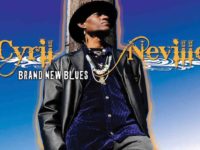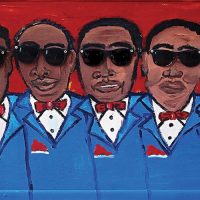by Nick DeRiso
Benny Spellman’s “Fortune Teller,” a witty early-1960s story song, is one of my touchstone party records.
Everything about it is perfectly New Orleans, from the pounding piano to this sizzling island-tinged percussion, from a group of yelping, mesmerizingly groovy R&B backup singers to its not one but two gotcha lyrics.
Spellman, see, goes to a fortune teller only to be stunned with the news that he’s fallen for someone. Problem: Spellman’s not seeing anybody. She counters: “When the next sun rises, you’ll be looking in her eyes.”
Morning comes, and nothing. Spellman rushes back to the fortune teller, “mad as I could be. … Why’d she make a fool of me?” When he gets there, though, the truth blooms before his very eyes: “While looking at the fortune teller, I fell in love!”
It all ends in merry marital bliss — oh, but with one final winking aside: “And now I get my fortune told for free!”
Issued by Spellman on the Minit label in 1962, “Fortune Teller” was later covered by the Rolling Stones in 1963 (one of their earliest sessions for Decca), then The Who (you’ll find it on the expanded 1995 edition of “Live at Leeds”), The Hollies, Cyril Neville, Alison Krauss with Robert Plant, and a host of others. The tune was actually written by Allen Toussaint, though it’s been credited variously to Naomi Neville (a pseudonym of Toussaint’s; it’s his mother’s maiden name) and Jessie Hill, who recorded it initially.
The funny part: Benny Spellman, such a integral part of the low-end sound in New Orleans’ early R&B (that’s his grumbling bass part on Ernie K-Doe’s “Mother-In-Law”, and on Earl King’s “Trick Bag,” too), was actually from … Pensacola, Fla.
 He only came to New Orleans after chancing into a gig with the touring band of Huey “Piano” Smith, a key influence on Dr. John. Smith’s van had crashed in Florida, and he needed a ride back — which Spellman, looking for musical work, happily provided.
He only came to New Orleans after chancing into a gig with the touring band of Huey “Piano” Smith, a key influence on Dr. John. Smith’s van had crashed in Florida, and he needed a ride back — which Spellman, looking for musical work, happily provided.
Spellman became something of a local legend after a stint at New Orleans’ celebrated juke the Dew Drop Inn. In fact, for a time, he was one of the most popular R&B artists in town, but unfortunately didn’t receive much more national notice.
He used that smooth baritone to hit in 1962 with Allen Toussaint’s “Lipstick Traces (On a Cigarette),” the A-side to “Fortune Teller” later revived by the O’Jays, and saw a single called “Work Game” released in 1965 but subsequently retired from music — reportedly to work for a local Budweiser distributor.
Every time I hear “Fortune Teller” — catchy, clever and always fun — I wonder how much more Spellman could have done if he would have stuck with it.
Still, after switching careers, I suppose he now got his beer for free.
That’s its own kind of good fortune.
- How Deep Cuts on ‘Music From Big Pink’ Underscore the Band’s Triumph - July 31, 2023
- How ‘Islands’ Signaled the Sad End of the Band’s Five-Man Edition - March 15, 2022
- The Band’s ‘Christmas Must Be Tonight’ Remains an Unjustly Overlooked Holiday Classic - December 25, 2016




